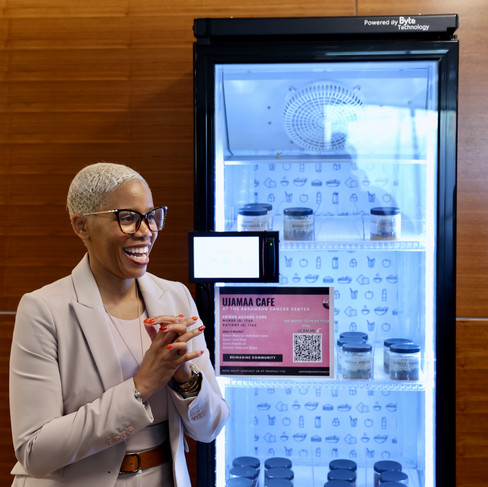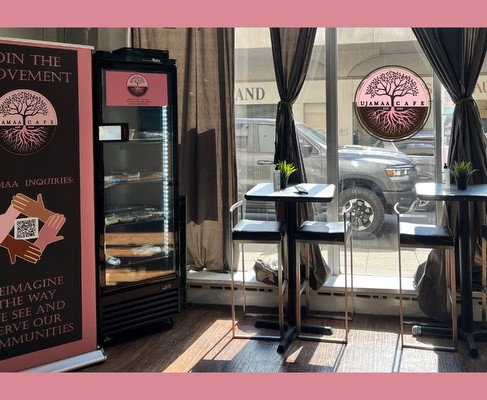
In the heart of New Jersey, a wave of change is quietly but powerfully transforming communities. Dr. Leeja's vision, deeply rooted in innovation, sustainability, and love, is driving this transformation. Her journey, marked by resilience and a relentless pursuit of knowledge, offers an inspiring blueprint for community empowerment.
Dr. Leeja Carter grew up primarily in New Jersey, having moved there from Pennsylvania when she was about eight years old. She considers herself a Jersey girl and fondly recalls her upbringing surrounded by a village-like community of family members, including grandparents and great-aunts. Dr. Carter's parents divorced when she was young, and she was largely raised by her mother, who worked multiple jobs to support the family. Despite financial challenges, her father, a stay-at-home dad before the divorce, imparted a love for cooking and creativity in making something out of nothing, which significantly influenced Dr. Carter's solution-focused approach to life.
Educational Experience
Dr. Carter's educational journey began with a strong interest in forensics during high school, eventually leading her to pursue a bachelor's degree in psychology and a master's degree in forensic psychology from Fairleigh Dickinson University. However, her path took a turn as she became more interested in sports psychology and health psychology, influenced by her experiences as a college athlete and her family's health issues. She earned her PhD in kinesiology and exercise psychology from Temple University, focusing her research on gendered and environmental racism and its impact on black women's physical activity and health.
Dr. Carter has held teaching positions at Camden County College, Rutgers, and Assistant Professor positions at Adler University - Chicago, Long Island University - Brooklyn (LIU), and Temple University. Her passion for teaching and affecting change through education is evident, but she also experienced frustration with the gap between research and practical implementation in the community. This drive to create tangible change led her to initiate community-based projects, such as the Hudson County Hunger Project during the COVID - 19 pandemic, which provided meals to vulnerable populations in Hudson County.
From Academia to Advocacy
Her academic pursuits were not just about collecting degrees but about equipping herself with the tools to make a tangible difference. Understanding the science behind body movements, especially for vulnerable populations like pregnant women, was crucial in shaping her holistic approach to community health and wellness. Dr. Leeja emphasizes the importance of using data to address social issues, specifically food insecurity and nutrition inequity in historically disinvested communities. By creating coalitions that utilize data, they aim to reverse the adverse effects in food apartheid neighborhoods and transform food deserts through a racial justice lens.

Coalition for Food Equity and Justice
The creation of the coalition was a pivotal moment in Dr. Leeja's journey. Recognizing the deep-seated issues of food insecurity and nutrition inequity exacerbated by the COVID-19 pandemic, she set out to address these challenges head-on with the Hudson County Hunger Project. The Food and Health Equity Coalitions’ efforts extend to educational programs like the Eating Better Together program, which aims to improve children's oral hygiene through good nutrition. Additionally, programs like the Rapid Response Program provide immediate support in crisis situations, ensuring that nutritional needs are met even during emergencies.
Central to this effort is the Ujamaa Cafe program, featuring computerized, tech-enabled community fridges placed within food apartheid locations. This initiative not only provides free access to healthy food but also reinvests in the community by partnering with local food entrepreneurs. The fridges serve as a reinvestment strategy, ensuring that the money goes back into the community to support food entrepreneurs and sustain the program.
Empowering the Youth: The Sankofa Program
The Sankofa program exemplifies Dr. Leeja's commitment to nurturing future entrepreneurs. This nine-month youth food entrepreneurship program takes children's food product ideas and transforms them into complete, marketable products. By equipping the next generation with the skills and knowledge to succeed in the food industry, the program fosters a sense of ownership and empowerment among young people.
The impact of these initiatives is far-reaching. From keeping fridges stocked to launching new youth programs, Dr. Leeja's efforts are rooted in the belief that the future of community health and wellness lies in sustainable, community-driven solutions. Her work is not just about providing immediate relief but about creating long-term, systemic change.

A Call to Action
Dr. Leeja's story is a call to action for all of us. It reminds us that community transformation starts with a vision and a willingness to act. Whether it's through donating to keep the fridges stocked, volunteering for community programs, or simply spreading the word about these initiatives, everyone has a role to play in this journey of transformation.
As Dr. Leeja reflects on her journey, she emphasizes the importance of staying grounded in one's mission and purpose. For those considering a similar path, her advice is clear: "The only person that knows you is God and you." It's a reminder that true change begins with self-awareness and a deep commitment to one's values and vision.
In a world where the challenges can often seem overwhelming, Dr. Leeja's story is a beacon of hope. It shows that with passion, dedication, and a collaborative spirit, we can create communities that are not only resilient but thriving. Let her journey inspire us to envision and work towards a future where equity, justice, and wellness are accessible to all.








